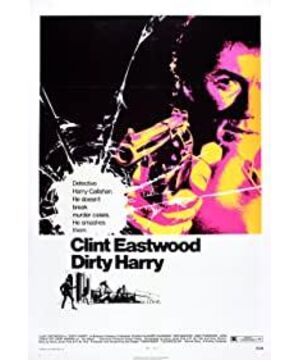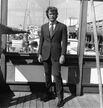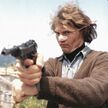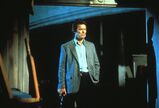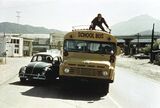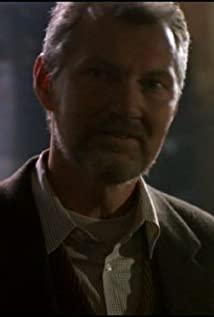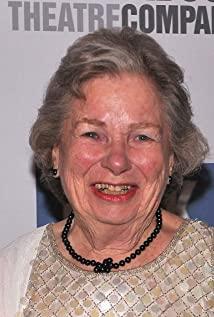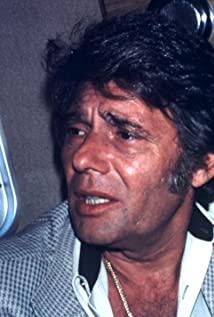In California, dominated by radical thoughts, a new era seems to be about to emerge. Those young movie fanatics who were baptized by the European New Wave finally emerged. Western films, film noir and other genres finally disappeared. Color widescreen, live shooting, and methodological acting have gradually become the mainstream of Hollywood, and they are called by the film historian. The era of "New Hollywood" has finally come. In this worst and craziest era, a new genre carrier and genre characters are needed to bear all the pain and madness of this era; the cowboy’s frantic sandy territory has been swallowed by excessive civilization, and criminals are hiding in the underground world of the city. , Is just one aspect of the story; in the context of the rapid increase in urban crime rates, the incompetent police figure who was usually on the edge of the story finally became the focus of the times. And "Dirty Harry" is one of the best.
The birth of a new policeman
"Do you know why they call me dirty Harry? Because every dirty job will fall into my hands." Harry is the most notorious policeman in San Francisco. At the beginning of the film, he was preemptive He shot and killed a rapist and was punished by his superiors. Don’t think that the city’s high-sounding judicial and government institutions don’t need him: this is a city tainted by crime and tainted by perverted sex. Robbery is like a common meal. You regularly visit the shops and banks on both sides of the street, and you can take a peek. You can find the endless spread of desire behind the curtains. Where the law cannot penetrate, violence seems to be the only solution; although colleagues in the police station are so hostile to Harry, Harry is still a despicable tool to keep their hands clean.
Harry, starring Clint Eastwood, is the most famous figure portrayed by the Hollywood conservative. In terms of the character pedigree of film history, this film directed by Don Siegel inherits the western film starring Eastwood and directed by Sergio Leone. In that series of movies, Eastwood played a taciturn, morally nihilistic cowboy; and when Westerns gradually lost the market, Don Siegel cleverly transplanted this character into the modern urban concrete jungle. As a result, the desert town became a high-rise urban building, alley duels evolved into street fights, cowboys stopped riding horses, and cars led them through the corners of the city. Noon's tribute: Gary Cooper threw the badge into the trash because he was betrayed by the villagers, while Eastwood and Don Siegel obviously went further, leaving the hypocritical justice and cynicism behind the government.
Director Siegel once considered John Wayne, Frank Sinatra or Marlon Brando to play this role, but, obviously, Clint Eastwood is the best choice. Cruel but cruel, old and elegant, every wrinkle on Eastwood's face seemed to tell the lone ranger's loneliness and anger. Harry, wearing a gray suit and holding a 44 Magnum pistol, became the idol of a whole generation. Not only did he spark a four-episode sequel, but he also inspired countless followers to imitate him. In one fell swoop, he established the narrative style and character image of the new police film genre.
The most classic scene in the film takes place on the streets of Pine Street in San Francisco. At the time, Harry was eating there and the bank across the street was robbed. When the police could not arrive in time, Harry could only act alone again; violence Once again became the only way to resolve the crisis. After the fire fight, the traffic jams and panicked pedestrians fled. The alarm bell sounded like a siren singing, and the fire-preventing device hit was like a fountain watering the hot San Francisco streets. During a long-shot follow-up, Harry slowly walked towards the only surviving criminal. In the subjective shot of the criminal, the 44 Magnum in Harry's hand was enlarged like a fetish, and Harry said his classic lines:
"I know what you are thinking.'Did this guy fire six shots or five shots?' To be honest, because I was so excited, I forgot to count. But I was holding a 44mm revolver, this The most powerful pistol in the world, it can blow your head, you should ask yourself,'Am I lucky today?' What do you think, scum?"
In this famous scene, real shooting and long shots created His sense of realism seems to instantly turn into a totem of surrealism. In the subjective shot, Harry's gritted teeth made the shot have a suffocating sense of horror, and 44 Magnum is no longer just a pistol, but symbolizes Harry's angry erection.
Zodiac Scorpion is
a brutal and violent detective who needs to match a more brutal and violent assassin to build a story that is enough to impact and subvert; the construction of a myth needs another myth as support. When Don Siegel aimed the 44 Magnum at the camera, he zoomed in another sniper rifle at the beginning of the film to even out of focus. The picture of the city he overlooks is almost a kind of ability that can take or rob an individual’s life, and this is the serial killer "Scorpion" in this film. His prototype is the ten that has created a great shadow in the hearts of Americans. Ninomiya killer. At the end of the 1960s, the Zodiac was popular in the San Francisco Bay Area, and the mystery he committed became an indestructible myth that threatened all core values of the United States.
Like Harry, the Zodiac also has a lot of visual legends. But Andy Robinson's interpretation of it in "Dirty Harry" is one of the most insane and subversive. The degree of authenticity made Robinson himself receive harassing calls and letters after the release of the film. In the new film "Zodiac" directed by David Fincher, there are also scenes showing "Dirty Harry". , From another side to pay tribute to the classic characters portrayed by Robinson.
"Scorpion" and Harry are almost complementary characters. These are two lonely madmen who are equally bloodthirsty. They are also unscrupulous to achieve their goals. However, in contrast to the cold-blooded Harry portrayed by Eastwood, Robinson's "Scorpion" is always on the verge of madness. However, the most ironic thing is that although the film did not give much explanation to "Scorpion"'s life experience, judging from his flowing hair and the word "peace" on the exaggerated belt buckle, this character was obviously a leftist radical in the 1960s. A member; perhaps, he used to be a "flower girl" who loves peace and anti-war, but now he has become a serial killer with unscrupulous means. The scariest thing about this film is that it does not try to explain why the "Scorpion" kills, kidnaps and tortured people. This is a person with no psychological depth. His terrorist behavior seems to come from an instinct. Violent pleasure, not a dark past that often appears in stale thrillers. But the most conservative point of this film is also here. The sudden change in the spirit of the times makes it so easy for people to imagine this character as a caricature of all evil.
If Harry and "Scorpion" are a pair of mirror images that reflect each other, then what they both refract is the incompetence of the law in this era and the ultimate loss of common value afterwards. When the inability to enforce the law made Harry shy away and even could only replace justice with personal violence, "Scorpion" was a full-fledged opportunist. He is a contempt and destroyer of the law, but he is also a fencer who is good at using "neutral" laws to protect all his rights. No matter how evil he is, no matter how evil he is, he can always do it. Finding his own living space in the crevices of the law, and from time to time to tooth-for-tooth, biting Harry fiercely. The famous stadium torment scene in the film is a comprehensive presentation of the film’s moral ambiguity. When the extremely angry Harry couldn’t suppress the urge to kill the "Scorpion" and inflict physical torture on him, the always powerful "Scorpion" Yelled that he needed a lawyer, and Harry had no power or evidence to execute his "lynching". So, when "Dirty Harry" came out in the early 1970s, although almost all the elite film critics condemned the "fascism" that Harry represented, ordinary people and even the police were applauding Harry. The divergence of American social values is inadvertently reflected through this movie.
Style milestones
The birth of a new genre depends on not only one or two characters that are sufficiently attractive and explanatory, but also requires a new style and atmosphere. The greatest contribution of "Dirty Harry" is that it is a milestone in the transition of Hollywood crime movies from studio setting to live shooting. What’s even more commendable is that although "Dirty Harry" is as fond of capturing urban night scenes as the previous crime movies, although the long montage of Eastwood running through the streets of San Francisco in the middle of the night is one of the most praised passages in this film, But it is the most eye-catching proof that the daily environment of the city during the day can also create an excellent and even psychedelic crime scene. This tendency is looming in the classic noir film "The Killer" that director Don Siegel previously remade. While classic film noir directors such as Robert Siodmak are accustomed to using high-contrast black-and-white photography and expressive scene design to create a feeling of fate, the new generation of directors Don Siegel tends to use more flat color photography. While the film noir emphasizes the separation of night and day in the city, and tells the story of insects infesting the neon of the night, Don Siegel's film is more modern: crimes are by our side, and we seem to be peaceful daily Life is always broken by sudden violence in a moment. In Don Siegel's long shots, this stagnation of daily life has even become a poetic reflection.
It is worth mentioning that "Dirty Harry" is not so much Don Siegel's personal work, as it is the crystallization of his collaboration with Eastwood. Although Eastwood’s directorial debut is recognized as the "Mistchaser" released in the same year as "Dirty Harry", according to Eastwood, he first directed the microphone in "Dirty Harry". At that time, Don Siegel was unable to participate in the filming because of a cold, so Eastwood became a director. The scene in the film that rescued suicides from tall buildings came from him. This scene also showed Eastwood's excellent director talent. He had to shoot through different camera positions in the small space of a high-rise building, and several camera positions needed to be suspended in the air by a crane. He not only directs the actors how to grasp the sense of life and death, but also presents the neon lights symbolizing sin and desire in the distance of the camera. And all of this, Eastwood has done very well.
Director Don Siegel once discussed with Eastwood whether to shoot what is now considered a classic stadium showdown. Because according to the movie-watching standards at the time, this was a scene that was extremely violent and could cause great harm to the star's image. But Eastwood flatly refused. Siegel sincerely praised Eastwood as the "most fascinated person by anti-heroes" he has ever seen. And it was the cooperation between these two geniuses that allowed us to see the scene that still looks extremely shocking: in the empty stadium, the violent gas lamp illuminates the lonely Harry and the "Scorpion". , "Scorpion"'s heart-piercing roar caused a hollow echo in the stadium; then, the camera slowly zoomed upwards and outwards, until the entire stadium was fully visible. Harry and "Scorpion" became the only two in this space. A little bit. At this moment, it seemed that all the violence that poured out was diluted by a compassionate God's perspective, and all the struggles and brutality of mankind got a strange sublimation in this spectacle lens.
View more about Dirty Harry reviews


